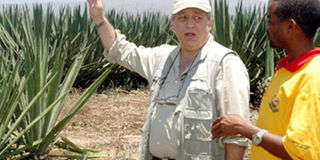Kenya needs Sh135bn every year to attain food security

PHOTO | FILE A worried farmer Basil Criticos, who is a former Taveta MP, shows a Nation reporter some of his sisal plantation. Kenya needs at least Sh135 billion annually to fully exploit its food production capacity by putting a minimum of 3.8 million hectares under production.
What you need to know:
- Lack of funds has led to low investment in the sector and only about 2.2 million hectares are being utilised, representing 57 per cent of land that is ideal for farming.
- The situation has been worsened with the reliance on rain-fed agriculture for food production instead of focusing on large-scale irrigation schemes.
- Among the factors responsible for farmers’ failure to exploit the country’s full potential is lack of working capital for investment in suitable harvesting methods.
Kenya needs at least Sh135 billion annually to fully exploit its food production capacity by putting a minimum of 3.8 million hectares under production.
Agriculture principal secretary Sicily Kariuki said financing agriculture is a challenge that all players, including the financial services sector, should support.
“The Sh135 billion is a substantial investment that cannot easily be met by one institution. It is necessary that joint resource mobilisation efforts are made in financing this huge investment portfolio,” Ms Kariuki said during a chama breakfast meeting hosted by Rafiki Microfinance Bank in Nairobi last weekend.
The PS was represented at the event by Mr Henry Ndege, the ministry’s deputy director in charge of agribusiness and market development.
Lack of funds has led to low investment in the sector and only about 2.2 million hectares are being utilised, representing 57 per cent of land that is ideal for farming.
The situation has been worsened with the reliance on rain-fed agriculture for food production instead of focusing on large-scale irrigation schemes.
FACTORS RESPONSIBLE
Among the factors responsible for farmers’ failure to exploit the country’s full potential is lack of working capital for investment in suitable harvesting methods.
Farmers are also unable to access machinery and affordable farm inputs.
“With vast land and large water masses, there is a need to initiate ways of encouraging the youth to engage in agribusiness activities geared towards creating employment with enough financing and other relevant support,” Kariuki said.
Rafiki, which is targeting farmers and people involved in agribusiness activities, brought together 500 chama representatives to offer them insights on how they can promote use of modern technologies, especially among smallholder farmers and the youth.
Little attention is, however, given to agriculture by financial institutions with less than 6 per cent of financing in the microfinance sector going to agribusiness.
Investment groups, known as chamas, control more than Sh300 billion with a focus on the agribusiness and real estate, among other investments.
Financial institutions like Rafiki are now turning their focus on financing agribusinesses to support the youth.
“Agribusiness-related activities directly and indirectly contribute to over 50 per cent of the gross domestic product.
Funding to this sector is important as it creates jobs, especially among the thousands of school-leaving youths and for economic growth,” said Rafiki Microfinance’s chief executive officer, Mr Daniel Mavindu.
So far, Rafiki has been involved in the financing of dairy farming and horticulture and in providing credit through the warehouse receipt system in addition to supporting access to machinery by farmers.
Despite this, financing the sector has been made difficult by risks associated with farming coupled with complex laws and tenure systems that limit the use of land as collateral. Another problem is continued fragmentation of arable land.
Limited investment in the sector has led to worsening food insecurity in the country. A recent report by the World Food Programme, the World Bank, and the Economist Intelligence Unit (EIU), said that at position 79 out of 107 countries, Kenya fares poorly on the global food security ranking index.
According to the Global Food Security Index, 2013, Kenya was ranked at an average 37 per cent in parameters like food availability, affordability and quality, safety, and food inflation.
“In Kenya’s Northern and North-Eastern pastoral zones, deterioration in food security is evident,” said the World Food Programme.
The report also ranked Kenya poorly in public expenditure on agricultural sector research and development.
, a situation that has led to the worsening food security situation in the country.




